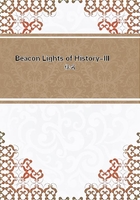
第74章
Hallam's Middle Ages; Sismondi's Histoire des Francais; Guizot's History of Civilization (translated); Michelet's History of France (translated); Bell's Historical Studies of Feudalism; Lacroix's Manners and Customs of the Middle Ages; Mills's History of Chivalry; Sir Walter Scott's article in Encyclopaedia Britannica;Perrot's Collection Historique des Ordres de Chivalrie; St.
Palaye's Memoires de l'Ancienne Chivalrie; Buckle's History of Civilization; Palgrave's English Commonwealth; Martin's History of France; Freeman's Norman Conquest; M. Fauriel's History of Provencal Poetry; Froissart's Chronicles; also the general English histories of the reign of Edward III. Don Quixote should be read in this connection. And Tennyson in his "Idylls of the King" has incorporated the spirit of ancient chivalry.
THE CRUSADES.
A. D. 1095-1272.
The great external event of the Middle Ages was the Crusades,--indeed, they were the only common enterprise in which Europe ever engaged. Such an event ought to be very interesting, since it has reference to conflicting passions and interests. Unfortunately, in a literary point of view, there is no central figure in the great drama which the princes of Europe played for two hundred years, and hence the Crusades have but little dramatic interest. No one man represents that mighty movement. It was a great wave of inundation, flooding Asia with the unemployed forces of Europe, animated by passions which excite our admiration, our pity, and our reprobation. They are chiefly interesting for their results, and results which were unforeseen. A philosopher sees in them the hand of Providence,--the overruling of mortal wrath to the praise of Him who governs the universe. I know of no great movement of blind forces so pregnant with mighty consequences.
The Crusades were a semi-religious and a semi-military movement.
They represent the passions and ideas of Europe in the twelfth and thirteenth centuries,--its chivalry, its hatred of Mohammedanism, and its desire to possess the spots consecrated by the sufferings of our Lord. Their long continuance shows the intensity of the sentiments which animated them. They were aggressive wars, alike fierce and unfortunate, absorbing to the nations that embarked in them, but of no interest to us apart from the moral lessons to be drawn from them. Perhaps one reason why history is so dull to most people is that the greater part of it is a record of battles and sieges, of military heroes and conquerors. This is pre-eminently true of Greece, of Rome, of the Middle Ages, and of our modern times down to the nineteenth century. But such chronicles of everlasting battles and sieges do not satisfy this generation.
Hence our more recent historians, wishing to avoid the monotony of ordinary history, have attempted to explore the common life of the people, and to bring out their manners and habits: they would succeed in making history more interesting if the materials, at present, were not so scanty and unsatisfactory.
The only way to make the history of wars interesting is to go back to the ideas, passions, and interests which they represent. Then we penetrate to the heart of history, and feel its life. For all the great wars of the world, we shall see, are exponents of its great moving spiritual forces. The wars of Cyrus and Alexander represent the passion of military glory; those of Marius, Sylla, Pompey, and Caesar, the desire of political aggrandizement; those of Constantine and Theodosius, the desire for political unity and the necessity of self-defence. The sweeping and desolating inundations of the barbarians, from the third to the sixth century, represent the poverty of those rude nations, and their desire to obtain settlements more favorable to getting a living. The conquests of Mohammed and his successors were made to swell the number of converts of a new religion. The perpetual strife of the baronial lords was to increase their domains. The wars of Charlemagne and Charles V. were to revive the imperialism of the Caesars,--to create new universal monarchies. The wars which grew out of the Reformation were to preserve or secure religious liberty; those which followed were to maintain the balance of power. Those of Napoleon were at first, at least nominally, to spread or defend the ideas of the French Revolution, until he became infatuated with the love of military glory. Our first great war was to secure national independence, and our second to preserve national unity. The contest between Prussia and France was to prevent the ascendency of either of those great States. The wars of the English in India were to find markets for English goods, employment for the sons of the higher classes, and a new field for colonization and political power. So all the great passions and interests which have moved mankind have found their vent in war,--rough barbaric spoliations, love of glory and political aggrandizement, desire to spread religious ideas, love of liberty, greediness for wealth, unity of nations, jealousy of other powers, even the desire to secure general peace and tranquillity. Most wars have had in view the attainment of great ends, and it is in the ultimate results of them that we see the progress of nations.